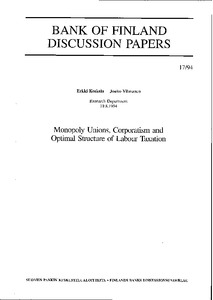Monopoly unions, corporatism and optimal structure of labour taxation
Koskela, Erkki; Vilmunen, Jouko (19.08.1994)
Numero
17/1994Julkaisija
Suomen Pankki
1994
Julkaisun pysyvä osoite on
https://urn.fi/URN:NBN:fi:bof-20140807480Tiivistelmä
According to the conventional theory of competitive labour markets formal incidence of income and payroll taxes is irrelevant in the sense that it does not matter in terms of welfare effects which side the tax is levied on.In this paper this issue is re-examined under imperfectly competitive labour markets by using monopoly union model of wage and a employment determination adjusted for corporatism as the vehicle for analysis.The irrelevance of the structure of labour taxation holds under equal tax bases if there is no uncertainty.Trade unions create a distortion in the labour market by setting the wage rate too high a level; with only one distortion it does not matter which instrument income or payroll taxation is used to eliminate that.In the first best case unions should be subsidized and the more so the higher is the degree of corporatism.The structure of labour taxation matters even under certainty if tax bases are unequal and there is some degree of corporatism.Finally, if tax bases are equal, there is idiosyncratic stochastic component in the wage rate and unions are risk-averse, it is desirable to use both income and payroll taxation; trade unions create a distortion and risk is inefficiently allocated so that one needs two instruments to deal with the two inefficiencies.Given the positive income tax it is desirable to introduce a subsidy to employers.Roughly, the income tax serves as social insurance to decrease risk associated with the wage rate and the payroll subsidy is assigned to deal with labour market distortion.Under full corporatism the tax structure is irrelevant even under uncertainty.
